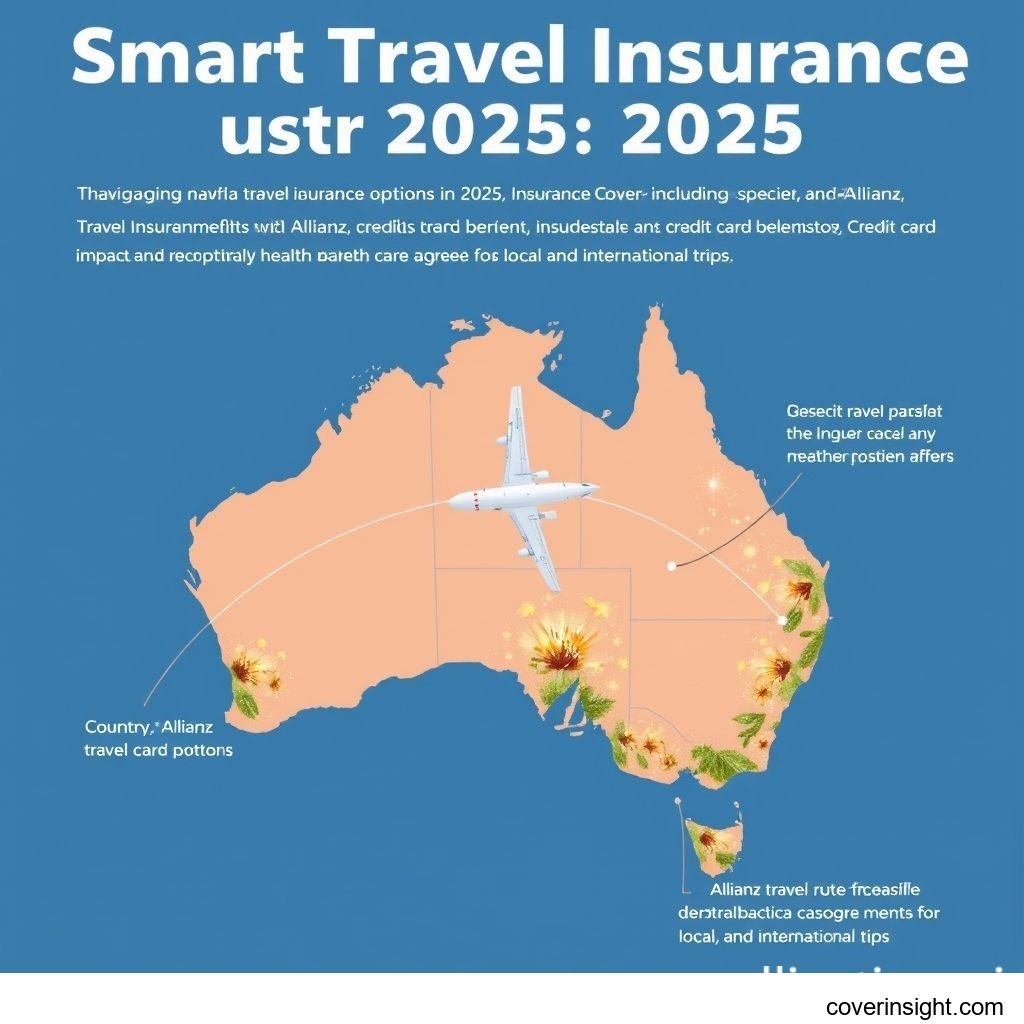Travel Insurance AU 2025: Compare Allianz, RACQ, Credit Card & More!
Introduction
As Australians plan their adventures for 2025, understanding the nuances of travel insurance becomes paramount. In an unpredictable world, comprehensive coverage offers peace of mind, safeguarding against unforeseen circumstances. Among the myriad options available, Allianz travel insurance stands out as a prominent choice for many Australian travellers, known for its global presence and range of policies. This guide will delve into what Allianz travel insurance offers, how it compares with alternatives like RACQ and the often-overlooked credit card travel insurance, and provide essential insights to help you make an informed decision for your upcoming trips.
Travel insurance isn't merely a formality; it's a critical safety net. Whether facing a medical emergency overseas, dealing with lost luggage, or needing to cancel a trip unexpectedly, the right policy can save you from significant financial distress. Given the evolving landscape of global travel, securing adequate protection for 2025 is more important than ever.
Coverage Details
When considering any policy, especially Allianz travel insurance, understanding the scope of coverage is crucial. Policies are designed to address a variety of risks, but their specifics can vary widely. It’s essential to scrutinise the Product Disclosure Statement (PDS) to know exactly what you’re covered for.
What’s Included
A robust travel insurance policy typically encompasses several key areas of protection. Allianz travel insurance policies often feature comprehensive benefits designed to address common travel mishaps. Here’s a general overview of what you can expect to be included:
-
Overseas Medical and Hospital Expenses: This is often the most critical component, covering emergency medical treatment, hospital stays, and sometimes even emergency dental work while abroad. Medical costs in certain countries can be exorbitant without cover.
-
Trip Cancellation and Interruption: Reimbursement for non-refundable expenses if your trip is cancelled, curtailed, or delayed due to unforeseen events like illness, injury, natural disaster, or a death in the family.
-
Lost, Stolen, or Damaged Luggage and Personal Belongings: Coverage for the loss, theft, or damage of your luggage, clothing, and other personal items during your trip.
-
Travel Delays and Rerouting: Compensation for additional accommodation, meals, or transport costs incurred due to significant travel delays, often for a minimum delay period.
-
Personal Liability: Protection if you accidentally cause injury to someone or damage their property while travelling.
-
Rental Vehicle Excess: Covers the excess payment you might be liable for if your rental car is stolen or damaged.
-
Emergency Evacuation and Repatriation: Covers the cost of transporting you to the nearest appropriate medical facility or back to Australia if medically necessary.
Many policies, including those from Allianz, also offer optional add-ons for specific activities like winter sports, cruises, or adventure sports, allowing you to tailor your Allianz travel insurance policy to your itinerary.
Common Exclusions
Just as important as knowing what’s covered is understanding what isn’t. All travel insurance policies have exclusions, and being aware of them can prevent unwelcome surprises during a claim. Common exclusions across many providers, including Allianz travel insurance, typically include:
-
Pre-existing Medical Conditions (Undisclosed/Unapproved): If you have a medical condition and don't declare it or it’s not approved for cover, any related claims may be denied.
-
Acts of War or Terrorism: Most standard policies do not cover events arising from war, civil unrest, or acts of terrorism.
-
Self-inflicted Injury or Illness: Injuries or illnesses resulting from intentional self-harm or illegal activities.
-
Intoxication: Claims arising from incidents where you were under the influence of alcohol or non-prescription drugs.
-
Extreme Sports and Risky Activities: Unless specifically added as an optional extra, activities like bungee jumping, mountaineering, or scuba diving beyond certain depths are often excluded.
-
Negligence: Leaving belongings unattended, failing to secure property, or not taking reasonable precautions.
-
Changes in Travel Advisories: Travelling against government advice or to regions under ‘Do Not Travel’ warnings. For up-to-date advice, consult the Australian government's Smartraveller website.
Always read the Product Disclosure Statement (PDS) meticulously before purchasing any policy to fully understand its terms, conditions, and exclusions.
Cost Analysis
The cost of travel insurance is a significant factor for many travellers. While it might seem like an extra expense, it's a small price to pay for the security it provides. The premium for Allianz travel insurance or any other provider is determined by a range of variables.
Key Factors Affecting Premiums
Several elements contribute to how much your travel insurance will cost. Understanding these can help you manage your budget and find a policy that offers good value.
-
Destination: Travelling to countries with high medical costs (e.g., USA, Canada) or those considered higher risk will generally result in a higher premium.
-
Duration of Trip: Longer trips inherently carry more risk, leading to higher premiums.
-
Age of Travellers: Premiums typically increase with age, particularly for
senior travel insurance, due to the higher likelihood of medical claims. -
Type of Policy: Comprehensive policies, with broader coverage and higher benefit limits, are more expensive than basic plans.
-
Number of Travellers: Family policies might offer discounts compared to individual policies, but the total cost will still depend on the number of people covered.
-
Pre-existing Medical Conditions: Declared and approved pre-existing conditions often incur an additional premium loading.
-
Planned Activities: Engaging in adventure sports or activities with higher inherent risks may require additional cover at an extra cost.
-
Excess Amount: Choosing a higher excess (the amount you pay upfront for a claim) can reduce your premium.
Maximising Savings on Your Policy
While cost is a factor, compromising on essential coverage isn't advisable. However, there are smart ways to potentially save on your Allianz travel insurance or other policies without sacrificing vital protection:
-
Compare Quotes: Use comparison websites or get direct quotes from multiple insurers. Don't just look at the price; compare the coverage details side-by-side.
-
Bundle Policies: If you travel frequently, an annual multi-trip policy might be more cost-effective than buying single-trip policies each time. Some insurers, like Allianz, offer these options.
-
Adjust Your Excess: As mentioned, choosing a higher excess can lower your upfront premium. Just be sure you're comfortable paying that amount if you need to make a claim.
-
Buy Early: While last-minute purchases are possible, buying well in advance, especially after booking non-refundable elements of your trip, ensures you're covered for cancellation benefits from the start.
-
Review Coverage Needs: Don't pay for coverage you don't need. If you're not renting a car, you might not need rental vehicle excess cover. Tailor the policy to your specific trip.
-
Look for Discounts: Insurers sometimes offer online discounts, loyalty bonuses, or discounts for bundling home and travel insurance.
-
Check Your Existing Policies: Some home and contents insurance policies might offer limited coverage for personal belongings while travelling, though usually not comprehensive medical or cancellation cover.
Remember, the cheapest policy isn't always the best. Prioritise adequate coverage for your specific needs over simply finding the lowest price.
Comparing Allianz with Other Providers
While Allianz travel insurance is a strong contender, it's wise to compare it with other reputable providers in the Australian market, such as RACQ, and also understand the limitations of credit card travel insurance.
Allianz vs. RACQ Travel Insurance
Both Allianz and RACQ are well-established names, but they cater to slightly different market segments and offer varying product ranges.
Allianz Travel Insurance:
-
Global Reach: As a large international insurer, Allianz boasts extensive global emergency assistance networks. This can be a significant advantage for travellers requiring assistance in remote or less common destinations.
-
Variety of Plans: Offers a wide range of plans, from basic medical-only to comprehensive packages, catering to different budgets and travel styles. They also have specific plans for cruises, seniors, and frequent travellers.
-
Online Accessibility: Often provides a straightforward online quote and purchase process, with detailed PDS documents readily available.
RACQ Travel Insurance:
-
Member Focus: RACQ (Royal Automobile Club of Queensland) primarily serves its members, often offering benefits and discounts to them. While non-members can purchase, members typically receive preferential rates.
-
Australian Focus: While covering international travel, RACQ's strength lies in its deep understanding of the Australian market and its members' needs, often bundling with other RACQ services.
-
Customer Service: Known for a strong emphasis on member-centric customer service.
Key Differences to Consider:
-
Geographic Focus: Allianz has a broader global footprint, potentially offering a slight edge in international emergency response. RACQ, while covering international, is primarily Queensland/Australian-centric.
-
Membership Benefits: If you're an RACQ member, their insurance might be more competitive due to loyalty discounts. Otherwise, Allianz could offer more direct value.
-
Specific Needs: Both offer various plans, but comparing their specific PDS for your unique requirements (e.g., pre-existing conditions, adventure sports) is crucial.
Ultimately, the best choice depends on your specific needs, whether you are an RACQ member, and your travel destination. Always get quotes from both and compare the PDS side-by-side.
The Role of Credit Card Travel Insurance
Many Australians unknowingly possess credit card travel insurance as a perk of their premium credit cards (e.g., Platinum, Black, or Signature cards). While convenient, it's crucial to understand its limitations.
Pros of Credit Card Travel Insurance:
-
Convenience: It's often "free" (included in the annual card fee) and automatically activates when you pay for your trip with the card.
-
Basic Coverage: Can offer fundamental coverage for overseas medical emergencies, trip cancellation, or lost luggage.
Cons and Limitations of Credit Card Travel Insurance:
-
Activation Requirements: Strict conditions often apply, such as spending a minimum amount on flights/accommodation with the card, or activating the cover manually. Failing to meet these can invalidate your policy.
-
Limited Coverage: Typically offers less comprehensive benefits than dedicated policies like Allianz travel insurance. Benefit limits may be lower, and exclusions more numerous (e.g., fewer covered activities, stricter conditions for pre-existing conditions).
-
Age Restrictions: Many
credit card travel insurancepolicies have age limits (e.g., often not covering travellers over 75 or 80) or significantly reduced benefits forsenior travel insurance. -
Pre-existing Conditions: Cover for pre-existing medical conditions is usually very limited or non-existent, often requiring a medical assessment or declaration with a separate premium payment.
-
Excesses: High excesses can apply, reducing the effective benefit.
-
No Choice of Provider: You're stuck with the insurer chosen by the credit card company.
Recommendation: Credit card travel insurance should be viewed as a last resort or supplementary cover, not a primary comprehensive solution for most trips. Always contact your credit card issuer to get the full PDS and understand exactly what is (and isn't) covered before relying on it. For serious travel, a dedicated policy from a specialist provider like Allianz is almost always a safer bet.
Special Considerations
Certain groups of travellers or specific circumstances require a more nuanced approach to travel insurance.
Navigating Senior Travel Insurance
For older Australians, finding suitable and affordable senior travel insurance can sometimes be a challenge. As age increases, so does the perceived risk of medical claims, leading to higher premiums. However, many insurers, including Allianz, offer tailored options for seniors.
Key considerations for senior travel insurance:
-
Age Limits: Be aware that some policies have upper age limits, or significantly increase premiums beyond a certain age (e.g., 70, 75, 80).
-
Pre-existing Medical Conditions: This is particularly critical for seniors. Always declare all pre-existing medical conditions. Many insurers will assess these and may provide cover, often for an additional premium. Failure to declare can invalidate your entire policy.
-
Medical Evacuation: Ensure the policy has high limits for medical evacuation and repatriation, as these costs can be astronomical.
-
Frequency of Travel: If you travel multiple times a year, an annual multi-trip policy designed for seniors might be more cost-effective than single-trip policies.
-
Policy Inclusions: Look for policies that specifically cater to senior-specific needs, such as coverage for mobility aids or specific medications.
It's highly recommended that senior travel insurance seekers compare policies from several providers and thoroughly review the PDS for age limits and pre-existing condition clauses. Don't hesitate to call insurers directly to discuss your specific medical history.
Pre-existing Medical Conditions and Cover
This is one of the most common reasons for travel insurance claims to be denied. A pre-existing medical condition is generally defined as any illness, injury, or condition that you have or have had, or for which you have received treatment, advice, or medication, prior to purchasing your policy.
What to do:
-
Declare Everything: Be completely honest and declare all pre-existing medical conditions when you get a quote. Insurers often have a medical assessment process, which can be online or via a phone questionnaire.
-
Understand the Outcome: Based on your declarations, the insurer will typically:
-
Cover the condition automatically at no extra cost.
-
Cover the condition for an additional premium.
-
Exclude the condition from cover.
-
Decline to offer cover altogether.
-
-
Read the PDS: If your condition is covered, read the specific terms and conditions carefully, as there may be exclusions or limitations related to it.
-
Don't Guess: If you're unsure whether a condition needs to be declared, err on the side of caution and declare it, or seek clarification directly from the insurer.
Failing to declare a pre-existing medical condition, even if unintentional, can lead to your claim being denied, leaving you with significant out-of-pocket expenses for medical treatment overseas.
How to Choose the Right Policy & Purchase Tips
Selecting the perfect travel insurance policy amidst the array of choices can feel daunting. However, a structured approach can simplify the process, ensuring you secure the best protection for your trip, whether it’s from Allianz travel insurance or another reputable provider.
Steps to Selecting Your Ideal Policy
-
Assess Your Needs:
-
Destination & Duration: Where are you going, and for how long? Medical costs vary greatly by country.
-
Activities: Will you be doing anything adventurous (skiing, diving, hiking at altitude) that requires special cover?
-
Valuables: Are you taking expensive items (laptops, cameras, jewellery) that need adequate personal belongings cover?
-
Medical History: Do you or any fellow travellers have pre-existing medical conditions?
-
Budget: How much are you willing to spend on a premium?
-
-
Compare Providers and Policies:
-
Don't just look at price. Compare the level of cover for key areas: medical, cancellation, baggage, and liability.
-
Look at benefit limits, excesses, and specific exclusions.
-
Check customer reviews and ratings for claim handling efficiency and customer service. Sites like ProductReview.com.au or Trustpilot can be useful.
-
-
Read the Product Disclosure Statement (PDS):
-
This cannot be stressed enough. The PDS is the legal document outlining what is covered, what isn't, and under what conditions. Pay close attention to sections on:
-
Emergency Medical Expenses
-
Trip Cancellation & Interruption
-
General Exclusions
-
Specific Exclusions related to your activities or medical conditions.
-
-
-
Understand Your Excess:
- A higher excess reduces your premium, but means you pay more out-of-pocket if you claim. Choose an excess you're comfortable with.
-
Consider Add-ons:
- Do you need extra cover for cruises, winter sports, adventure activities, or specific valuable items? Factor these into your comparison.
-
Purchase Early:
- Buy your policy as soon as you start incurring non-refundable costs (e.g., flights, accommodation). This ensures you're covered for cancellation benefits from the earliest possible point.
By following these steps, you can confidently choose a travel insurance policy that provides comprehensive coverage tailored to your specific travel plans and personal circumstances. For broader insights into insurance, refer to resources like Insurance Resources Global. For Australia-specific information, visit AU Insurance Home.
FAQs
Here are answers to some frequently asked questions about travel insurance, particularly concerning Allianz travel insurance and general considerations.
How much does alianz travel insurance cost?
The cost of Allianz travel insurance varies widely depending on numerous factors such as your destination, duration of travel, age, chosen level of cover, and any declared pre-existing medical conditions. A short trip to New Zealand for a young traveller might cost under $100, while a multi-month trip to Europe for a senior with pre-existing conditions could be several hundred or even thousands of dollars. The best way to determine the exact cost is to obtain a direct quote from the Allianz website or a comparison site, inputting your specific travel details.
What affects premiums?
As discussed in the Cost Analysis section, key factors affecting travel insurance premiums include:
-
Destination: Countries with higher medical costs or perceived higher risk.
-
Trip Duration: Longer trips mean more days of potential risk.
-
Age of Travellers: Premiums generally increase with age, especially for
senior travel insurance. -
Policy Type: Comprehensive policies are more expensive than basic ones.
-
Pre-existing Medical Conditions: Additional costs often apply for covering declared conditions.
-
Activities: Risky activities may require extra cover.
-
Excess Chosen: A higher excess can reduce the premium.
Is travel insurance mandatory?
While not legally mandatory for entry into most countries, travel insurance is highly recommended. Some countries, however, do require proof of medical travel insurance for visa applications or entry (e.g., some Schengen Area countries, Cuba, Russia). Regardless of legal requirements, travelling without insurance is a significant financial risk, as you would be personally responsible for all costs arising from medical emergencies, trip cancellations, or lost belongings. Reputable bodies like the Australian Prudential Regulation Authority and the Insurance Council of Australia strongly advocate for adequate insurance coverage.
How to choose the best policy?
Choosing the "best" policy depends entirely on your individual needs and circumstances. There's no one-size-fits-all answer. Follow these steps:
-
Assess your specific needs: Destination, duration, activities, medical history.
-
Compare different providers and policies: Don't just compare prices; compare cover levels, exclusions, and benefit limits.
-
Read the Product Disclosure Statement (PDS): Understand what is and isn't covered.
-
Consider reputation: Look at customer reviews for claims handling and service.
-
Don't rely solely on
credit card travel insurance: It often has significant limitations.
What are the consequences of no coverage?
The consequences of travelling without adequate travel insurance can be severe and financially devastating. You could face:
-
Exorbitant Medical Bills: Hospitalisation and medical treatment overseas, especially in countries like the USA, can run into hundreds of thousands of dollars, which you would have to pay out-of-pocket.
-
High Evacuation Costs: Emergency medical evacuation back to Australia can cost over $100,000.
-
Lost Trip Costs: You would lose all non-refundable expenses (flights, accommodation, tours) if you have to cancel or cut short your trip due to an unforeseen event.
-
Lost or Damaged Belongings: No compensation for stolen luggage, passports, or personal items.
-
Legal Fees: No cover for personal liability if you accidentally injure someone or damage property.
In essence, having Allianz travel insurance or a similar comprehensive policy is a fundamental part of responsible travel planning for 2025 and beyond.








Comments